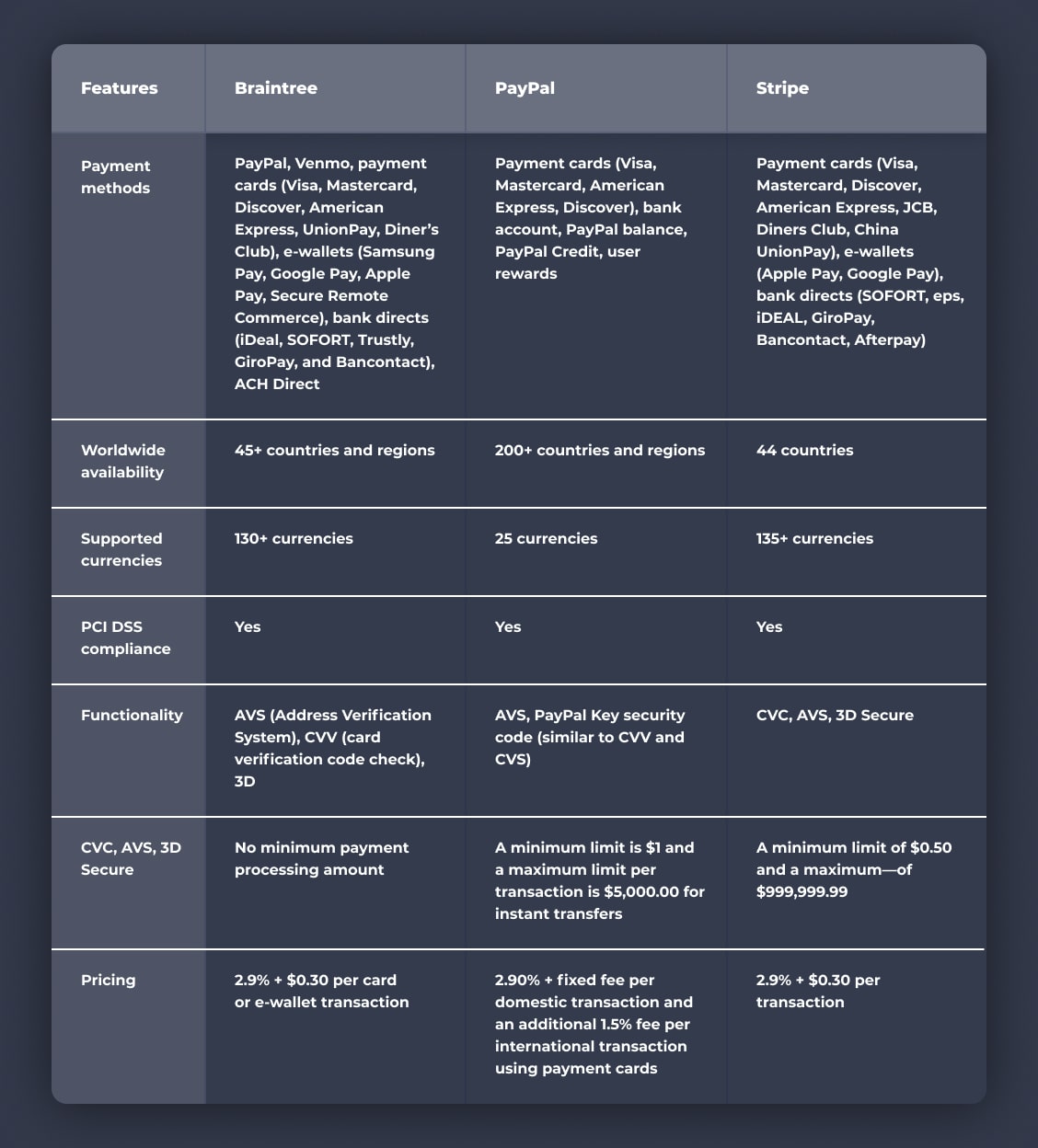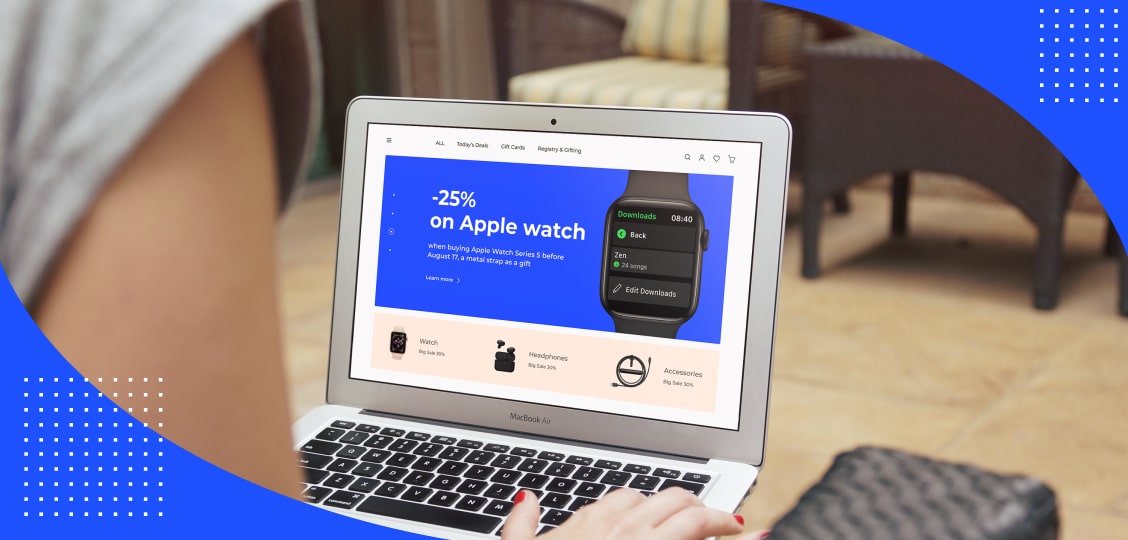Choosing a payment gateway for an e-marketplace platform
1.
Study payment methods
When choosing a payment gateway system, make sure that it supports
payment options used by the target audience. For instance, Braintree
enables customers to make purchases employing the majority of credit
and debit cards that involve Visa, Mastercard, Discover, American
Express, UnionPay, and Diner’s Club. Braintree supports digital
wallets that include Samsung Pay, Google Pay, Apple Pay, and Secure
Remote Commerce.
With Braintree, an online marketplace platform can accept payments
via PayPal, the world’s leading gateway. The main difference between
them is that Braintree offers individual merchant accounts while
PayPal serves as a third-party processor employing a single account.
By integrating PayPal, businesses allow users to shop online using
their bank accounts, credit and debit cards, PayPal balance, PayPal
Credit (for purchases starting from $99), as well as rewards like
cash back and points collected from stores.
Stripe is another popular solution that makes it possible to use a
variety of payment cards (Visa, Mastercard, American Express, JCB,
Discover, China UnionPay, etc.) and mobile wallets (Google Pay,
Apple Pay).
When looking for the best payment gateway for an e-marketplace,
you should also consider whether it accepts transactions via local
payment methods such as iDeal, SOFORT, Trustly, eps, GiroPay,
Bancontact.
In addition, you should take into account changing customer needs.
Statista
informs
that 82% of US consumers preferred to use credit and debit cards
when shopping online in 2019 while 80% of the survey’s participants
from Europe named payment services — involving PayPal and Alipay — as
their favorite options.
In 2020, electronic and mobile wallets became the most widespread
method,
accounting for
44.5% of the global e-commerce sales, according to FIS. By 2024,
these expenditures are projected to reach 51.7%.
Analysts report that credit cards amounted to 22.8% of e-commerce
transactions while debit cards — 12.3%. The popularity of payment
cards is expected to remain almost the same, decreasing to 20.8%
and 12% respectively. Therefore, you should enable these payment
methods when building a marketplace application.
2.
Consider countries supported by a payment gateway solution
Before choosing a payment gateway system, it is essential to verify
that it supports the necessary locations. If you want to build an
e-marketplace platform serving millions of customers globally, you
should consider PayPal, which is available in over 200 countries
and regions.
Stripe, Braintree, and other popular gateways also provide the
possibility to serve users worldwide but with more geographic
limitations. For instance, Germany, Argentina, Panama, Africa,
Belarus, Ukraine, and Israel don’t accept Stripe. At the moment,
Stripe allows for carrying out digital transactions in 44 countries.
To use Braintree, an organization has to operate and have a bank
account in the USA, Canada, Australia, Europe, Malaysia, Hong Kong
SAR China, New Zealand, or Singapore. Subject to these conditions,
a marketplace application will accept payments from any part of the
world. As of today, Braintree supports more than 45 countries and
regions.
3.
Check out the transaction limits of a payment gateway provider
To integrate a payment gateway that will meet business-specific
needs and budget, you should take into account transaction limits
set by a solution provider. Stripe, for example, has a minimum limit
of $0.50 and a maximum — of $999,999.99.
A maximum value will satisfy the requirements of most vendors,
probably excluding companies that trade real estate and luxury cars
online. Considering a minimum amount, it may not suit your needs if
you aim to build an e-marketplace selling goods that cost less than
$0.50.
In case a user account is verified, PayPal has no limits on the
amount of money sent by a customer. However, a user can transfer up
to $60,000 or less in a single digital transaction depending on the
currency.
Regarding instant transfers, a minimum limit is $1 while a maximum
limit per transaction is $5,000.00. It is worth noting that Braintree
doesn’t have a minimum payment processing amount, which is especially
convenient for businesses delivering low-priced products.
4.
Take into account prices of payment gateway providers
Payment gateway solutions undertake various responsibilities — from
transaction processing to verification of banking details — requiring
a fee in return. Commissions are generally charged according to
factors such as location and money transfer amount.
When choosing a payment gateway for a marketplace, it is essential
to study the terms of use and pricing. Payment gateway providers may
charge organizations for system installation, service utilization
per certain period, merchant account setup, as well as ask a fee for
each transaction.
Concerning practical examples, Braintree offers a standard price of
2.9% + $0.30 per card or e-wallet transaction. This plan includes
access to system functionality and support team.
Unlike many other services, the Braintree payment gateway doesn’t
require monthly fees. Furthermore, you can contact experts at
Braintree and ask to adjust pricing to the specific needs of vendors
operating on an e-marketplace platform.
Transaction rates of PayPal are divided into domestic and international
transfers. For instance, the company has a set limit for domestic
online commercial transactions of 2.90% + fixed fee and for
international transactions — an amount of 1.5%.
To employ Stripe, you have to pay a 2.9% + $0.30 per successful
electronic transaction. Stripe can also customize pricing taking
into account your business requirements.
5.
Make sure a marketplace payment gateway is compliant with PCI DSS
Launched in 2006, the Payment Card Industry Data Security Standard
(PCI DSS) strives to ensure that organizations — that store, transmit,
or accept credit card data — safeguard sensitive information. The
primary objective of the PCI DSS is to achieve the safety of payment
accounts throughout transaction processing.
To meet the requirements, companies have to set up reliable passwords,
encrypt data, employ anti-virus programs, restrict data access,
maintain access logs, regularly scan networks for vulnerabilities,
and more.
Hence, it is crucial to make sure that a payment gateway solution is
compliant with PCI DSS before integrating with an online marketplace
platform. Stripe, PayPal, and Braintree are all certified PCI Service
Providers.



